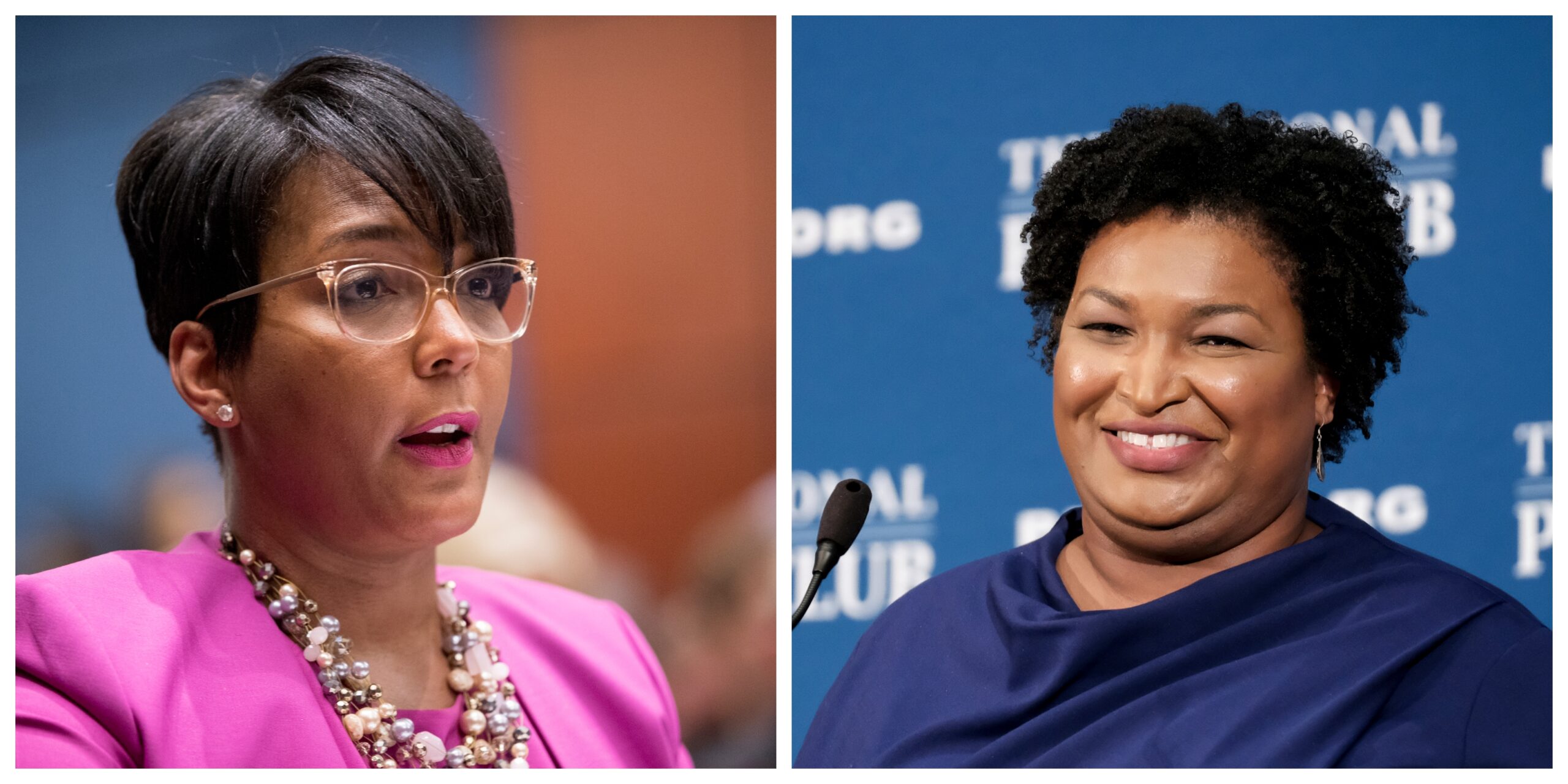Neither public rivals nor personal friends, Keisha Lance Bottoms and Stacey Abrams spent years climbing parallel ladders at Atlanta City Hall and the Georgia Capitol.
They are now Georgia’s most influential African American women.
Bottoms, the 50-year-old Atlanta mayor, is a top surrogate for Joe Biden, the presumptive Democratic presidential nominee. Abrams is the 46-year-old voting rights activist who nearly became the first black female governor in American history. Now, the pair occupy the same political intersection: Biden’s list of potential running mates.
That potential has highlighted the different styles of the two lawyers-turned-politicians. Abrams embraces the possibility of the vice presidency and, already having acknowledged her own presidential aspirations, openly touts how she’d help Biden win and govern. Bottoms, while not sidestepping the talk, plays the more traditional role of loyal party lieutenant.
While the possibility of being up for the same job could stoke conflict, Abrams, Bottoms and their associates instead frame their national profiles as a boost for black women.
“I see them leading in very different ways because of the positions they hold, and I adore them both,” said state party chairwoman Nikema Williams. It’s “inspiring” to watch “two black women from the South be elevated.”
Beyond Abrams and Bottoms, Biden is believed to be considering other women of color as his running mate, including California Sen. Kamala Harris and Rep. Val Demings of Florida.
In separate Associated Press interviews, Abrams declared Bottoms an “extraordinary” mayor and called herself “proud to be an Atlanta citizen under her leadership,” while the mayor praised Abrams’ “authentic leadership,” especially on behalf of underrepresented voters.
“I can’t say we’re close personal friends,” Bottoms said, adding that she sees their roles as outgrowths of the civil rights history that surrounds them in Martin Luther King Jr.’s hometown. “Atlanta has always been a special place where people of color are able to break traditional molds and change the landscape of who we are as a country.”
Unquestionably the more widely known of the two, Abrams was floated as a presidential candidate herself after her unsuccessful 2018 governor’s bid. She parlayed that narrow loss into an invitation to deliver the 2019 response to President Donald Trump’s State of the Union address. Throughout 2019, she was a regular stop on Democratic contenders’ visits to Georgia.
In recognition of Biden’s stature as former vice president, Abrams visited him in Washington last year, but she didn’t endorse until May 12, well after Biden emerged as the presumptive nominee. Before that, she willingly fielded questions about joining him on the ticket.
“As a young black girl growing up in Mississippi, I learned that if I didn’t speak up for myself, no one else would,” Abrams said recently on NBC’s “Meet the Press.”
She told the AP days before her endorsement that she’d “put my resume against anyone else’s.” She noted her state legislative work included international relations and highlighted her 2018 success in drawing hundreds of thousands of new voters to the polls.
Bottoms, meanwhile, was among Biden’s earliest endorsers. She recalled writing in a leather-bound campaign journal, “I feel vulnerable,” having declared loyalties among such a crowded field. That shouldn’t be confused with regret, she said, citing Biden’s “experience and the goodness of who he is.”
The mayor was a precinct captain in overwhelmingly white Iowa, where Biden finished an embarrassing fourth, before going on to the Southern states that reversed his fortunes.
“She didn’t run away when he was down,” said Tharon Johnson, a Bottoms confidant.
Asked what she’d bring to the ticket, Bottoms, a former judge and city councilor, noted that she’s served in each branch of government, with her executive tenure overlapping with a massive cyberattack on city government’s technology infrastructure and now the COVID-19 pandemic.
“You’ve got to have proven leadership that’s been tested in the midst of crisis,” she said.
As Abrams remains a favorite of many progressive activists, Bottoms has gotten a prominent mention from influential black leaders like House Majority Whip Jim Clyburn, who is close to Biden, and Biden campaign co-chairman Cedric Richmond.
The different approaches reflect how Bottoms has operated mostly within existing political machinery while Abrams has sought to build her own.
Three years ago, Abrams was the Georgia House minority leader building her 2018 campaign for governor; Bottoms was a city councilor running for mayor. Abrams had impressed Capitol circles but faced such skepticism as a statewide candidate that many older, white Democratic power brokers backed a white state representative from the Atlanta suburbs.
Bottoms, conversely, had the backing of outgoing Atlanta Mayor Kasim Reed, himself once viewed as a potential governor. Abrams’ primary opponent — not an Atlanta resident — endorsed Bottoms, while Abrams stayed on the sidelines. Bottoms, in turn, didn’t wade into the governor’s primary, but campaigned for Abrams later against Republican Brian Kemp.
“They’ve just operated in different spaces,” said Williams, the state party chairwoman.
Both politicians have shown signs of practicality.
Bottoms benefited from Reed’s help in 2017, but she’s since distanced herself from her predecessor, whose administration has been the subject of a federal criminal probe. She was among the big-city mayors to blast Trump’s immigration policies, and she ended the city jail’s contract with federal immigration enforcement. She’s leading the U.S. Conference of Mayors’ efforts on the census and housing policy.
And while Abrams calls for significant changes in U.S. social and political structures, she spent her tenure at the Capitol as an unapologetic pragmatist cutting deals with Republican Gov. Nathan Deal and GOP House leadership.
For her part, Bottoms says she has “a good working relationship” with Kemp, who defeated Abrams.
And while her style is more low-key, Bottoms makes clear that she has no problem with Abrams’ direct approach to ambition.
“I don’t think there’s ever anything wrong with touting and highlighting your work,” she said. “What I do on my day-to-day work hopefully shows the type of leader I am.”









